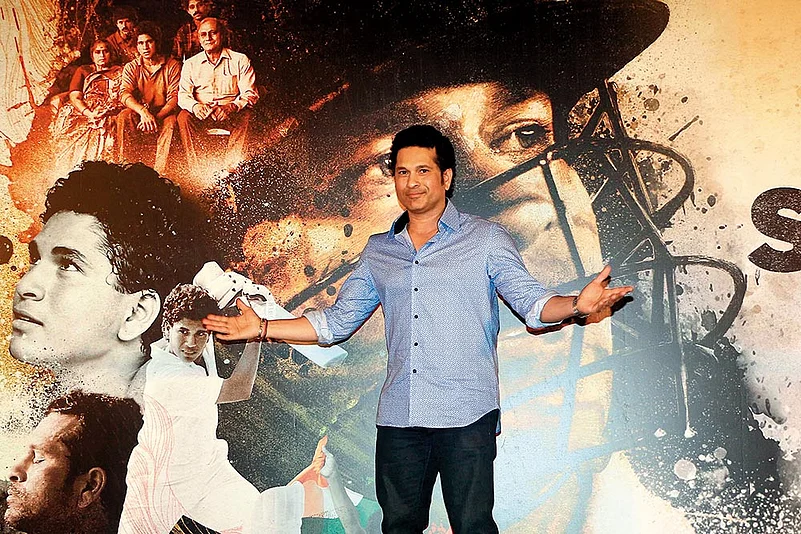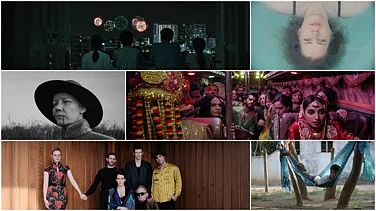Sachin Tendulkar is making a comeback next month. No, not at the batting crease but in cinema halls, with his own, INSpirational story splashed on celluloid. The trailer of Sachin: A Billion Dreams is out and is already giving anticipatory goosebumps to millions of adoring fans. And it is not a biopic like the recent spate of films on sportspeople—Dhoni, Azhar, Mary Kom—but a docu-film. Sachin plays himself, and publicists say it will have some unseen footage of his growing up years and family life. The nibble that is a trailer has already been gnawed at a million times over. The film has all the makings of a blockbuster.
Though Sachin’s fans may be eagerly awaiting its release on May 26, they would be hoping to see unknown facets of the cricketer they love, not another ladle of thick, gushy syrup made up of a laudatory voice-over, punctuated with footage of great strokes, and with nary a glimpse of his failures or foibles. For, Indian sports biopics inevitably end up as hagiographies. Why do filmmakers miss out on the human aspect, the frailties and the insecurities which, after all, make the backbone of any good script?
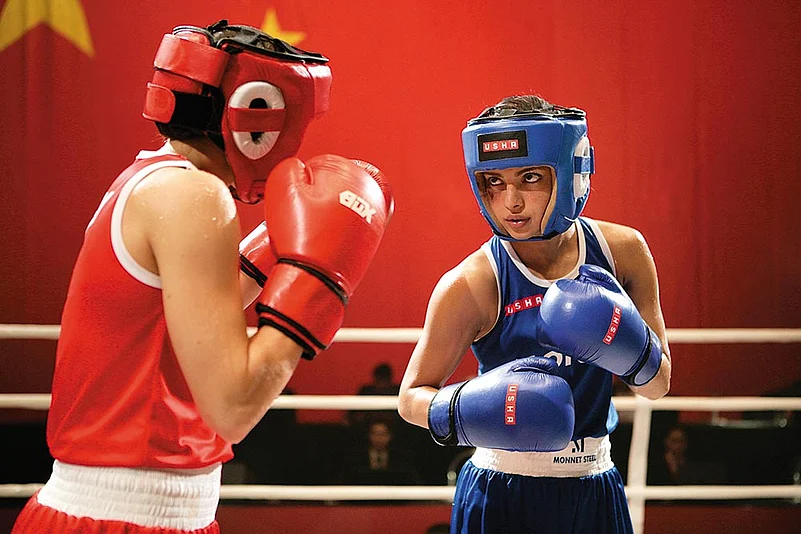
Mary Kom: It emphasises the physical strength of the multiple times world champion boxer, but doesn’t depict how she was mentally determined as well
Well, to begin with, the very mention of a sports biopic makes the producer take a 100-metre sprint, say those who have tried to make more realistic films, like Rakeysh Omprakash Mehra, who made Bhaag Milkha Bhaag—a big hit for a sports film, where Farhan Akhthar played the legendary athlete. “When I was thinking of making Bhaag Milkha Bhaag, I had a few challenges; nobody wanted to make a movie on a sportsman. Nobody wanted a film which didn’t have a love story, dancing hero and heroine and an item song. It took me around five years to get it on board—and this when I had Rang De Basanti behind me,” Mehra tells Outlook.
In his movie on Milkha Singh, Mehra took pains to show the searing struggles confronted by India’s most famous athlete, including his traumatic childhood—he was witness to the slaughter of his family members during Partition. But Indian sports biopics usually eschew the ‘real’ in favour of the grossly magnified magnificent. Ajitpal Singh, India’s lone hockey World Cup-winning captain, says he has watched almost all of them, and is disappointed at the absence of the real in them. “Vital information about the hero/heroine should not be supressed. If you are showing their positive sides, you must also show the wrongs in his character; for example, the bribes he has taken or matches he has fixed, because the audience anyway knows the reality. So why supress those things?” he asks, while conceding that filmmakers do add masala to sell their product. Ajitpal cites Aamir Khan’s Dangal, in which wrestler Geeta Phogat’s coach is shown locking up her father, played by Aamir, during a final of the 2010 Delhi Commonwealth Games to keep him from giving instructions to his daughter. “In reality, that didn’t happen. It was ‘masala’. If they don’t add masala, their biopics won’t click. Also, they have to ensure that the money invested is at least recovered,” he says.
Well-known London-based director James Erskine, who has directed Sachin: A Billion Dreams, believes sporting heroes should be portrayed in 360 degrees. “I’m not sure I’m in a position to talk about the Indian audience, but I think films should chart highs and lows and not be afraid of that. After all, what do the highs mean without the lows?” Erskine tells Outlook. Tony D’Souza, who directed Azhar, refutes the charge that Indian biopics are only paeans to sporting heroes. He argues that they have shown the “other side” of the athlete too. “I think what we do is what we get the information on. If I comment on my film, I think I have shown exactly what I wanted to show; there’s nothing that I didn’t want to show,” he says. Omprakash Mehra says it’s up to the director to take or leave out certain parts of a person’s life for his purpose. “A feature film is a work of fiction, drama and parts you borrow from real life. It’s entirely up to the filmmaker, the way he wants to tell the story. There’s no obligation as such. For instance, in Bhaag Milkha Bhaag, I wanted to tell the story of a lost childhood; I didn’t want to tell the story of where Milkha Singh was born, where he went to school, how many children he had. That’s the work of a documentary,” he says. But he does admit that Indians find it difficult to face reality. “As a nation, we don’t have the capacity to digest the truth, and the filmmakers don’t have the guts to tell it,” he says.
It remains to be seen what director Erskine and producer Ravi Bhagchandka have in store in Sachin: A Billion Dreams. “The film takes you through his personal journey. We’ve got his family’s perspective. We’ve got some good home videos that no one has seen before. We are trying to show the humane side of Sachin as well as the cricketer, a combination of both,” says Bhagchandka. What about Tendulkar’s cricketing lows, like his injuries etc? “Yes, we are going to show his struggles as well. I can’t talk more about the film right now,” he says.
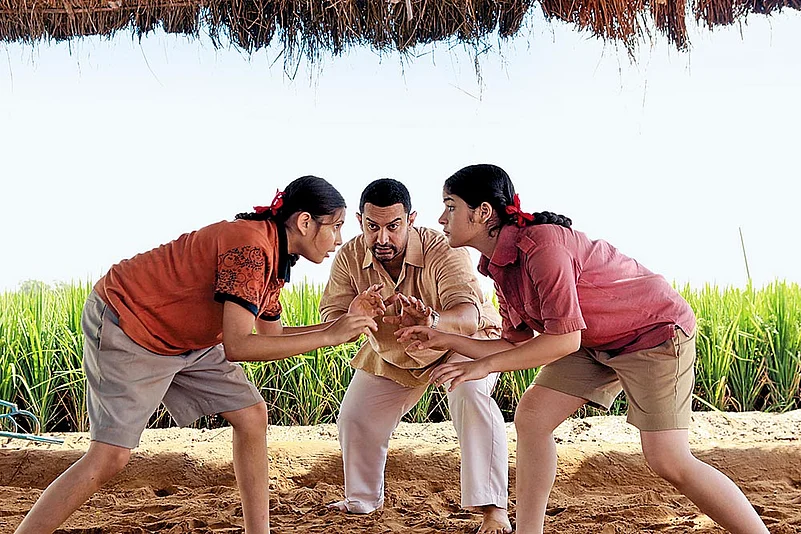
Dangal: Overly dramatised. For instance, it shows wrestler Geeta’s coach locking her father in a room during a final, something that never happened.
Raizada Rohit Jaising Vaid, who is supposedly directing hockey wizard Dhyan Chand’s biopic, says icons’ families have a say in what the story should be. “No human is God or above faults and mistakes. Trust the story of greatness and don’t shy away from showing the quagmire of human emotions and weaknesses which he/she fights and gets ahead,” he says. India is, anyway, not a sporting nation, but it has produced true legends like Dhyan Chand, Prakash Padukone, Mary Kom and Milkha Singh, whose lives have enough natural dramatic material that begs for screen portrayal. Billiards great Michael Ferreira thinks it’s wonderful to tell the world about Indian sporting greats through biopics. “Bhaag Milkha Bhaag was a pioneering effort.... Filmmakers should now identify and make films on those who have not been portrayed so far,” he says. One such great is the legendary Indian hockey captain Balbir Singh, a triple Olympic gold medallist, and his exploits are being re-enacted for the screen in the film Gold, directed by Reema Kagti, with Akshay Kumar playing Balbir.
Omung Kumar, who directed Mary Kom, featuring Priyanka Chopra, says the biopics idea has caught on, but people have to be patient. “All biopics will not be made at one go, because it will look like ‘me too, me too’. It will stop and again it will catch on.... Everybody has gone to sportspersons of repute. It will evolve, because if they all come out together the honour of making biopics will die,” he reasons. Omprakash Mehra says a biopic on Dhyan Chand would be a dream. “I don’t want to do it for commercial reasons.... But when people would stop asking those questions I’ll be the first to attempt that story. There are great stories to be told about our hockey legends, whether on Ajitpal Singh, Pargat Singh, Ashok Kumar or Aslam Sher Khan”.
Dhyan Chand, the hockey wizard who won three Olympic gold medals, is a bona fide sporting superhero, the one undisputed great sportsman in a young nation, and whose eventful life unfolded in equally eventful times. It’s a perfect fit for the screen. A contract was signed between Dhyan Chand’s son and former India captain Ashok Kumar and producer Pooja Shetty and director Raizada Rohit Jaising Vaid almost five years ago, but the project hasn’t taken off. The contract, say sources close to the parties, is doomed—it has been mutually agreed to be scrapped, with only “some paperwork left”. However, Vaid, who has written the story with Ila Bedi, insists: “This is a very fateful year for the film, and soon, by God’s grace, it will be going on the floor.”
If the project doesn’t take off, it will be unfortunate as Dhyan Chand, who captivated everyone, including the notoriously racist Nazi top brass, with his mesmerising stick-work in the 1936 Berlin Olympics, is inarguably India’s best-known athlete. Even Amar Chitra Katha broke from tradition to bring out a special edition on him! The centre-forward’s fans around the world would certainly expect to be hypnotised by his genius, as transmuted on the silver screen.
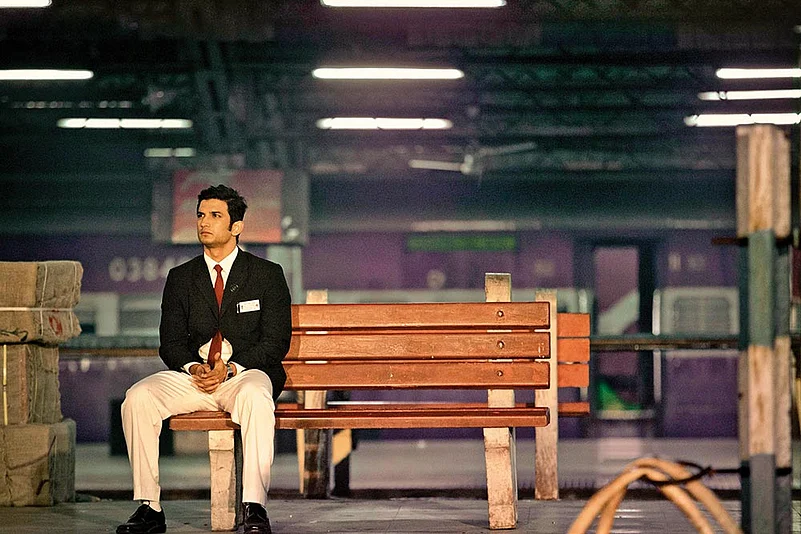
Dhoni—The Untold Story: His struggle as an aspiring cricketer is portrayed well, but once he gets into the national team, he can just do no wrong.
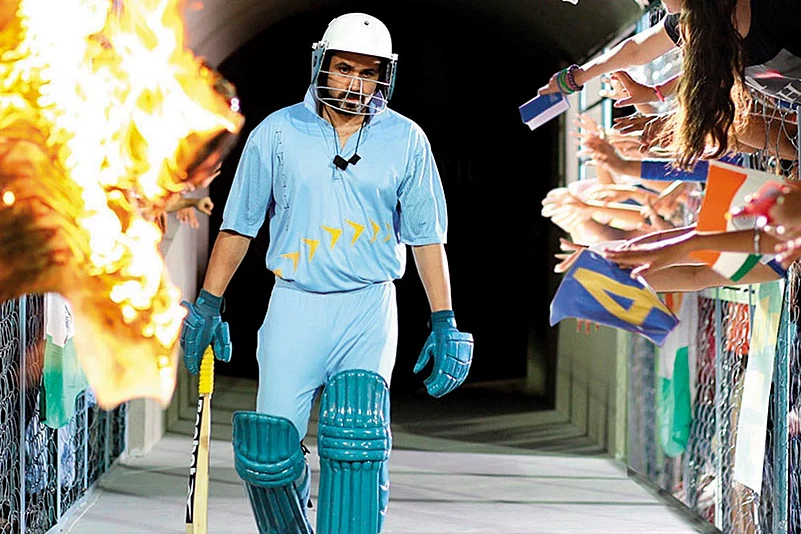
Azhar: It shows the cricketer returning money and a cellphone to a bookie after his conscience pricked him, but a CBI report on match-fixing claimed otherwise
For now, all eyes in cricket-obsessed India are on Tendulkar’s film. “Making the film has been a near three-year process—writing, directing, editing. We’ve been around the world and dug deep. Most of all, we hope that the film will be as loved as Sachin himself, that audiences will feel deeply moved and satisfied,” says Erskine, who wouldn’t mind doing another biopic on an Indian sporting legend. Hopefully, his latest is also about a maestro’s loneliness at the top and the unglamorous day-to-day toil, warts and all, that kept him there, rather than just his spectacular outings in showpiece events.






